Cabbage Soup Diet 7-Day Plan: Rapid Weight Loss & Nutrition
Find out if this supposedly magic potion in your kitchen can help you lose weight.

Image: Shutterstock
The cabbage soup diet is the best option for quick weight loss! Many people report losing up to 10 pounds within a week after following this diet.
It may seem so boring to live on cabbage soup for a week. But rest assured that cabbage soup is not your only option. There are many healthy foods to choose from. You can consume fruits, veggies, and proteins to boost your metabolism and satisfy your taste buds.
The cabbage soup diet focuses on soup detoxification that can make you feel more energetic and active. It is also a great choice for vegans who wish to incorporate a plant-based diet into their routine. However, you should also keep in mind that this diet plan is not suitable for long-term weight loss. Your immune system will weaken if you stick to only cabbage diet soup for a long time.
This article discusses the 7-day cabbage soup diet, alternative foods, cabbage detox soup recipes, exercise suggestions, and the health benefits of cabbage soup. Scroll down to learn more.
In This Article
All You Need To Know About Cabbage Soup Diet For Weight Loss
- What Is The Cabbage Soup Diet?
- How Does The Cabbage Soup Diet Work?
- The 7-day Cabbage Soup Diet Chart
- How To Prepare The Original Cabbage Soup Diet Weight Loss Recipe?
- Substitutions For The Cabbage Soup Recipe
- The Scientific Explanation Behind This Diet
- Benefits Of The Cabbage Soup Diet
- Side Effects Of The Cabbage Soup Diet
- Dos And Dont’s Of The Cabbage Soup Diet
1. What Is Cabbage Soup Diet?
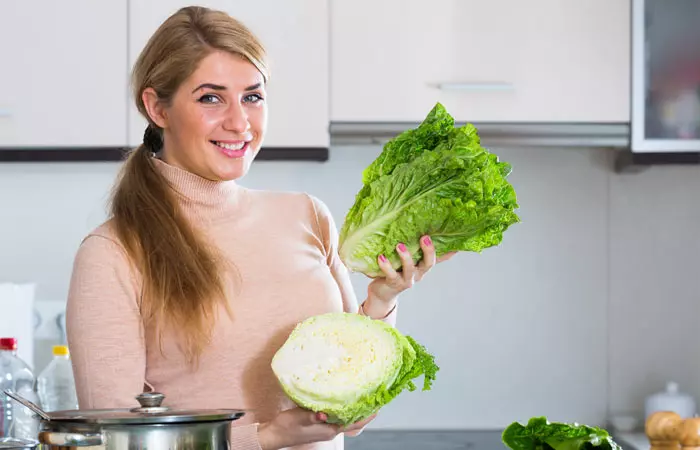
Kathrine Kofoed, ACE-certified Health Coach, says, “The cabbage soup diet was a popular fad weight loss diet in the 80s and involved only eating cabbage soup and fruit (but no bananas) for a week. After a few days, you could incorporate some other foods or beverages, like skim milk.”
This diet is part of a broader trend known as the Souping Diet, where consuming soup is the primary means of calorie intake.
The cabbage soup diet is a low-calorie soup diet plan designed to cause short-term weight loss. This simple fad diet, along with half an hour of exercise, delivers better results than months of sweating through a regular weight loss program.
 Fun Fact
Fun FactSo, does this diet actually work? Let’s find out!
2. How Does The Cabbage Soup Diet Work?
The cabbage soup diet works by jump-starting your body’s metabolism and fat mobilization. This diet restricts your calorie intake and forces your body to use fat as an energy source. Low sodium, low calories, and high fiber enable you to get in shape quicker than you would if you followed a moderate long-term eating plan.
Cabbage stew is often prescribed to obese patients as the diet is high in fiber and low in calories (1).
This is why the cabbage soup diet has successfully helped many people to lose weight. You too can lose weight by following the 7-day cabbage soup diet plan discussed below.
3. The 7-day Effective Cabbage Soup Diet Plan
There are several versions of the cabbage soup diet plan that have been around for years. You need to follow a strict diet chart for the 7-day period. Cabbage broth is the main item, and it is complemented with other foods to fulfill the nutritional requirements.

Day 1: Only Fruits
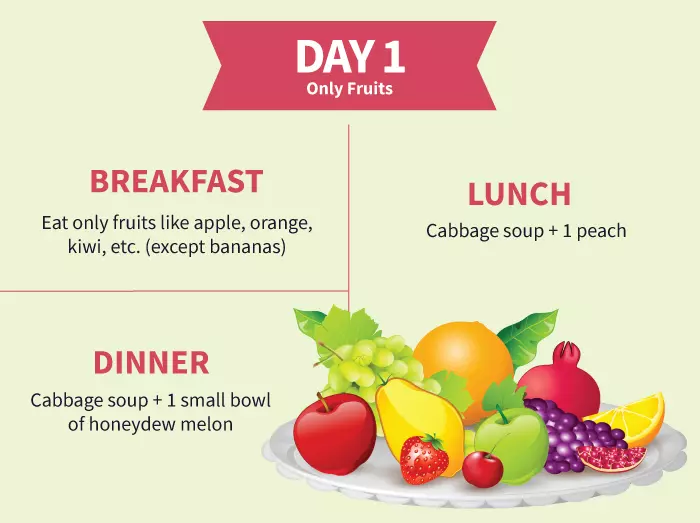
| Early Morning | Warm water with juice of half a lime |
| Breakfast | Eat only fruits like apple, orange, kiwi, etc. (except bananas) |
| Lunch | Cabbage soup + 1 peach |
| Post-Lunch | Snack on an apple or a guava |
| Dinner | Cabbage soup + 1 small bowl of honeydew melon |
Why It Works
Fruits are a great source of vitamins and minerals (2). Along with it when you eat cabbage soup, you also get the vital nutrients from the veggies. Bananas are high in calories (3), hence, it is not recommended on Day 1. Cabbage soup and fruits diet is the perfect way to start your cabbage soup diet regimen.
Warm water with lime juice is one of the best ways to start your day. It will help wash out the toxins and kick start your metabolism. Eat a lot of low glycemic index fruits on this day along with this low-sodium soup. In fact, you can have cabbage soup as many times as you want throughout the day to keep your hunger pangs at bay.
Foods To Eat
Fruits –
Apple, peach, plum, guava, orange, nectarine, melon, watermelon, and kiwi.
Vegetables – Cabbage, onion, leek, celery, carrot, spinach, and green beans.
Fats & Oils – Olive oil, rice bran oil, hemp seed oil, flax seed oil, sunflower oil, sunflower butter, clarified butter (ghee), and peanut butter.
Nuts & Seeds – Pumpkin seed, flax seed, melon seeds, almonds, walnuts, and hazelnuts.
Herbs & Spices – Coriander leaves, parsley leaves, rosemary, thyme, dill, oregano, cardamom, black pepper, cayenne pepper, cinnamon, fenugreek seeds, cumin, saffron, garlic, ginger, turmeric powder, and bay leaf.
Beverages – Green tea, black tea, black coffee, herbal tea, fresh fruit juice, and coconut water.
Condiments – Homemade coriander leaf chutney with lemon and salt, homemade mint chutney with lemon and salt, and homemade yogurt dip without sugar.
Foods To Avoid
Fruits –
Banana, mango, grapes, cherries, and papaya.
Vegetables – Potato and sweet potato.
Grains – All kinds of grains, including brown rice and oats.
Fats & Oils – Lard, butter, mayonnaise, margarine, and vegetable oil.
Nuts & Seeds – Cashew nuts.
Beverages – Alcohol, packaged fruit juices, and packaged coconut water.
Condiments – Tomato ketchup, chili sauce, soy sauce, mayonnaise dip, ranch dip, and tartar sauce.
Substitutes
Lime juice –
Apple cider vinegar
Apple – Watermelon
Orange – Muskmelon
Kiwi – Cucumber
Peach – Plum
Guava – Fig
Honeydew melon – Pomegranate
Precaution
Do not eat too many fruits at a time. Fruits contain sugar, and some may elevate sugar levels in those with diabetes.
Useful Tip
Wash the fruits thoroughly before eating. If you opt for a fruit salad, choose fruits that will provide your body with different types of vitamins and minerals. Do not panic if you feel weak. It is just your body’s reaction to the low carb and low sugar diet. Drink enough water throughout the day.
Exercises For Day 1
- Start your day early and with a warm-up.
- Next, run on the treadmill or go to the nearby park. Take rest in between if you are not habituated to running.
- After completing your run, do 2 sets of 5 push-ups, 2 sets of 5 sit-ups, scissor legs, jumping jacks, rope jumping, stairs running, bench press, leg curls, and aerobics.
- End with stretching exercises. Make sure you get one hour of exercise on Day 1.
Warning:
People with heart conditions or any other condition that does not allow them to perform these exercises should consult their doctor or a fitness trainer to know the best workout plan for losing weight.
How You Will Feel By The End Of Day 1
By the end of Day 1, you are going to feel great about yourself as you will feel lighter. The nutrients from the fruits and the cabbage soup will keep your energy levels high throughout the day, and you will look forward to Day 2 of this diet. Without much ado, let’s see what Day 2 has in store for you.
Day 2: Only Vegetables
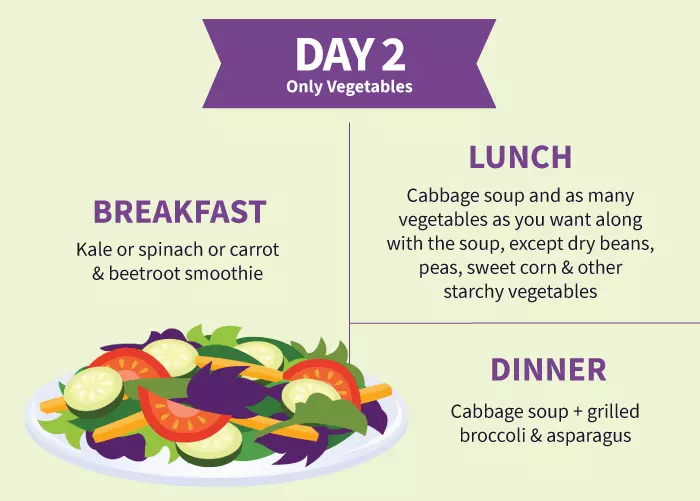
| Early Morning | Green/black tea or black coffee without sugar or artificial sweeteners |
| Breakfast | Kale or spinach or carrot and beetroot smoothie |
| Lunch | Cabbage soup and>as many vegetables as you want along with the soup, except dry beans, peas, sweet corn and other starchy vegetables |
| Post-Lunch | A small bowl of cucumber or baby carrots |
| Dinner | Cabbage soup + grilled broccoli and asparagus |
Why This Works
Welcome to Day 2. Start your second day by drinking green/black tea (with a dash of lime juice) or black coffee. Caffeine may help you lose weight, and the smell of the tea or coffee will kick start your day. For breakfast, have a vegetable smoothie to provide your body with nutrients that will help you mobilize fat. Have a bowl of cabbage soup with different kinds of green leafy veggies to feel full. If you feel hungry post lunch, snack on cucumber or carrots. Eat as many veggies as possible at every opportunity. For dinner, have a medium bowl of cabbage soup and some grilled veggies to break the monotony.
Foods To Eat
Vegetables –
Leek, celery, Chinese cabbage, cabbage, carrot, tomato, turnip, broccoli, green beans, kale, spinach, asparagus, beetroot, okra, and bottle gourd.
Fats & Oils – Olive oil, rice bran oil, hemp seed oil, flax seed oil, sunflower oil, sunflower butter, clarified butter (ghee), and peanut butter.
Nuts & Seeds – Pumpkin seed, flax seed, melon seeds, almonds, walnuts, and hazelnuts.
Herbs & Spices – Coriander leaves, parsley leaves, rosemary, thyme, dill, oregano, cardamom, black pepper, cayenne pepper, cinnamon, fenugreek seeds, cumin, saffron, garlic, ginger, turmeric powder, and bay leaf.
Beverages – Green tea, black tea, black coffee, herbal tea, fresh fruit juice, and coconut water.
Condiments – Homemade coriander leaf chutney with lemon and salt, homemade mint chutney with lemon and salt, and homemade yogurt dip without sugar.
Foods To Avoid
Vegetables –
Potato and sweet potato.
Fruits – Avoid eating all fruits on this day.
Grains – Avoid all kinds of grains, including brown rice and oats.
Fats & Oils – Avocado, lard, butter, mayonnaise, safflower oil, corn oil, and cottonseed oil.
Nuts & Seeds – Cashew nuts
Beverages – Alcohol, packaged fruit juices, and packaged coconut water.
Condiments – Tomato ketchup, chili sauce, soy sauce, mayonnaise dip, ranch dip, and tartar sauce.
Substitutes
Green/black tea or black coffee –
Herbal tea
Kale – Beet greens or broccoli
Spinach – Collard greens or chicory
Carrot – Celery, beetroot or apple
Beetroot – Broccoli, carrot, celery or spinach
Cucumber – Celery sprayed with balsamic vinegar
Broccoli – Cauliflower, okra or collard greens
Asparagus – Leek, bok choy or Brussels sprouts
Precaution
Do not add sugar or artificial sweeteners to your tea or coffee as they can hinder your weight loss. Avoid eating starchy veggies.
Useful Tip
You may drink a cup of green tea or black coffee if you do not have the time to eat cucumber or carrots post lunch. Use olive oil to grill the veggies for dinner. If you do not like grilled veggies, you may have them sauteed.
Exercises For Day 2
- Start by warming up and stretching.
- Run on the treadmill or in the nearby park.
- On this day, focus on your abs. Do pushups – 2 sets of 10 reps, scissor kicks – 3 sets of 10 reps, air cycling – 2 sets of 10 reps, spiderman plank crunch – 2 sets of 10 reps, and bicycle crunch – 2 sets of 10 reps.
- End by doing arm circles – 1 set of 10 reps (forward and backward), tricep push-ups – 2 sets of 5 reps, single chest press pulse – 1 set of 20 reps, inchworm, and shoulder press – 1 set of 5 reps. Circle your neck, and stretch your legs.
- Relax and rest for few minutes.
Warning:
People with heart conditions or any other condition should consult their doctor or a fitness trainer to know the best workout plan for losing weight.
How You Will Feel By The End Of Day 2
After the fruits day (Day 1), you will like having meals consisting of different kinds of veggies. It’s a great day to experiment. Prepare snacks and breakfast that include healthy portions of veggies. Since veggies contain a lot of dietary fiber, your gut health will improve.
Now that Day 2 is over successfully, you will be prepared for Day 3 more than ever.
Day 3: Fruits And Vegetables
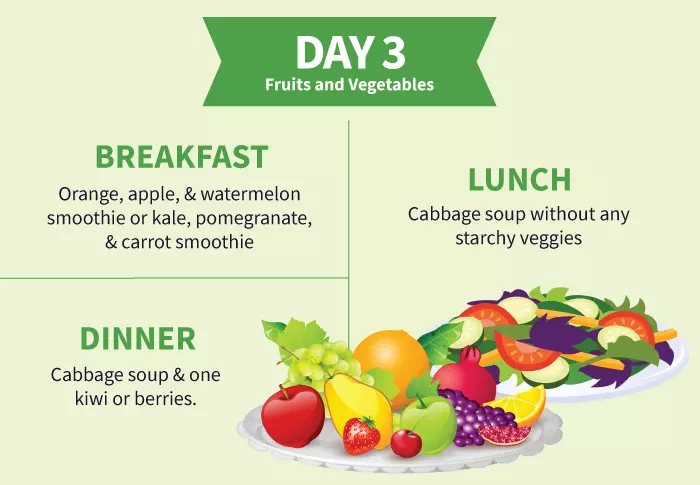
| Early Morning | Warm water with lemon juice and 1 tablespoon organic honey |
| Breakfast | Orange, apple, and watermelon smoothie or Kale, pomegranate, and carrot smoothie |
| Lunch | Cabbage soup without any starchy veggies |
| Post-Lunch | Fresh pineapple juice or honeydew melon juice |
| Dinner | Cabbage soup and 1 kiwi or berries |
Why This Works
Warm water with lemon juice and honey is the perfect way to start the third day as it will help flush out the toxins and boost immunity. Since this is a fruits and vegetables day, for breakfast, drink a glass of smoothie to activate your brain, muscles, and organs. Cabbage soup will make you feel full, keep your hunger pangs at bay, and provide you with a lot of fiber to mobilize the fat. You may feel a little hungry in the evening. Having a glass of fresh fruit juice will rejuvenate your body and provide energy. A small bowl of cabbage soup and a fruit for dinner will help your digestive system and help you sleep better.
Foods To Eat
Vegetables – Leek, celery, Chinese cabbage, cabbage, carrot, tomato, turnip, broccoli, collard greens, radish greens, green beans, kale, spinach, asparagus, beetroot, okra, and bottle gourd.
Fruits – Kiwi, watermelon, melon, plum, pomegranate, berries, and pineapple.
Fats & Oils – Olive oil, rice bran oil, hemp seed oil, flax seed oil, sunflower oil, sunflower butter, clarified butter (ghee), and peanut butter.
Nuts & Seeds – Pumpkin seed, flax seed, melon seeds, almonds, peanuts, walnuts, macadamia nuts, and hazelnuts.
Herbs & Spices – Coriander leaves, parsley leaves, rosemary, thyme, dill, oregano, cardamom, black pepper, cayenne pepper, cinnamon, fenugreek seeds, cumin, saffron, garlic, ginger, turmeric powder, and bay leaf.
Beverages – Green tea, black tea, black coffee, herbal tea, fresh fruit juice, and coconut water.
Condiments – Homemade coriander leaf chutney with lemon and salt, homemade mint chutney with lemon and salt, and homemade yogurt dip without sugar.
Foods To Avoid
Vegetables –
Potato, sweet potato, and radish.
Fruits – Mango, green grapes, black grapes, and pear.
Grains – Avoid all kinds of grains.
Fats & Oils – Lard, butter, margarine, mayonnaise, safflower oil, corn oil, and cottonseed oil.
Nuts & Seeds – Cashew nuts
Beverages – Alcohol, packaged fruit juices, and packaged coconut water.
Condiments – Tomato ketchup, chili sauce, soy sauce, mayonnaise dip, ranch dip, and tartar sauce.
Substitutes
Lemon juice –
Apple cider vinegar
Organic honey – Pure maple syrup (1/2 teaspoon)
Orange – Lime, lemon, or grapefruit
Apple – Blackberries
Watermelon – Honeydew melon or cucumber
Kale – Beet greens, spinach or broccoli
Pomegranate – Strawberry or pineapple
Carrot – Celery, beetroot or apple
Pineapple – Grapefruit or mango
Honeydew melon – Watermelon or guava
Kiwi – Cucumber or watermelon
Berries – Guava, apple or grapefruit
Precaution
Do not eat high glycemic index fruitsi Fruits with a high glycemic index (over 70) that quickly raise blood sugar and may be unhealthy if consumed in excess. , or if you have them, eat a little. Also, avoid starchy foods.
Useful Tip
Spice up the cabbage soup by adding herbs or spices of your choice. Do not add condiments available in the market as they contain a lot of added sugar. This also holds true for packaged fruit juices, so it is better to make fresh fruit juice or eat a whole fruit.
Exercises For Day 3
- Start by stretching your legs, waist, shoulders, arms, and neck.
- Spot jog for 5-7 minutes.
- Squats – 1 set of 10 reps.
- Jumping squats – 1 set of 10 reps.
- Cycling crunches- 2 sets of 10 reps.
- Work on your abs by doing horizontal and vertical scissor kicks.
- Lie on your back and lift your legs at a 45-degree angle and count to 10. Do this 5 times.
- Rope jumping (1 set of 50 jumps).
- Push-ups – 2 sets of 10 reps.
- Sit-ups and twists – 2 sets of 10 reps or 2 sets of 5 reps.
- End by doing neck rotations, shoulder rotation, and face exercises (click here to view the different face exercises).
Warning:
People with heart conditions or any other condition should consult their doctor or a fitness trainer to know the best workout plan for losing weight.
How You Will Feel By The End Of Day 3
You will love it when you see visible changes in your body by the end of Day 3. Veggies and fruits will help keep your hunger pangs at bay, and you will feel more conscious about your health. If you are used to binge eating, you might crave for junk food in the evening. Drink a glass of spiced up buttermilk to deal with the carb craving.
Day 3 is successfully over. Now get ready for Day 4 if you really want to look fabulous.
Day 4: Bananas And Milk
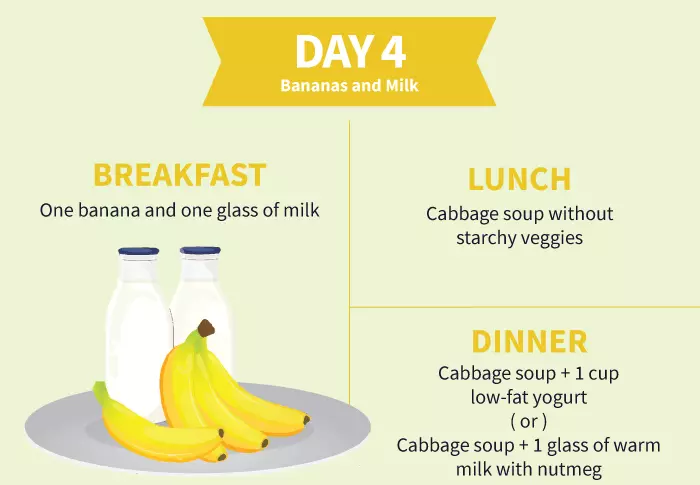
| Early Morning | Green/black tea with a dash of lime juice |
| Breakfast | 1 banana and 1 glass of milk |
| Lunch | Cabbage soup without starchy veggies |
| Post-Lunch | Banana milkshake |
| Dinner | Cabbage soup and 1 cup low-fat yogurt or A glass of warm milk with nutmeg |
Why This Works
Green or black tea blends really well with lime juice and instantly makes you feel fresh and rejuvenated. You will eat at least two bananas on this day. Bananas are a good source of potassium and dietary fiber (3). Milk is a good source of calcium, potassium, good fats, and protein (4). Therefore, you will get all the essential nutrients for your body from bananas and milk. You may include a small bowl of low-fat yogurt to support your digestion or a glass of warm milk with nutmeg to help you sleep better and wake up fresh the next morning.
Foods To Eat
Vegetables – Leek, celery, Chinese cabbage, cabbage, carrot, tomato, turnip, broccoli, collard greens, radish greens, green beans, kale, spinach, bok choy, Brussels sprouts, asparagus, beetroot, okra, bitter gourd, and bottle gourd.
Fruits – Banana, kiwi, melon, and apple.
Dairy – Milk, soy milk, buttermilk, and low-fat yogurt.
Fats & Oils – Olive oil, rice bran oil, hemp seed oil, flax seed oil, sunflower oil, sunflower butter, clarified butter (ghee), and peanut butter.
Nuts & Seeds – Pumpkin seed, flax seed, melon seeds, almonds, and hazelnuts.
Herbs & Spices – Coriander leaves, nutmeg, parsley leaves, rosemary, thyme, dill, oregano, cardamom, black pepper, cayenne pepper, cinnamon, fenugreek seeds, cumin, saffron, garlic, ginger, turmeric powder, and bay leaf.
Beverages – Green tea, black tea, black coffee, herbal tea, fresh fruit juice, and coconut water.
Condiments – Homemade coriander leaf chutney with lemon and salt, homemade mint chutney with lemon and salt, and homemade yogurt dip without sugar.
Foods To Avoid
Vegetables –
Potato, sweet potato, and radish.
Fruits – Mango, green grapes, black grapes, and pear.
Grains – Avoid all kinds of grains.
Fats & Oils – Lard, butter, margarine, mayonnaise, safflower oil, corn oil, and cottonseed oil.
Nuts And Seeds – Cashew nuts, walnuts, and macadamia nuts.
Beverages – Alcohol, packaged fruit juices, and packaged coconut water.
Condiments – Tomato ketchup, chili sauce, soy sauce, mayonnaise dip, ranch dip, and tartar sauce.
Substitutes
Green/black tea –
Black coffee or herbal tea
Lime juice – Apple cider vinegar or grapefruit juice
Banana – Kiwi (or just omit the banana and have cabbage soup)
Milk – Soy milk
Low-fat yogurt – Sour cream
Precautions
Do not drink milk if you are lactose intolerant. Opt for soy milk.
Useful Tip
Add half a teaspoon of cocoa powder to your milkshake to break the monotony. You may also add flax seed powder.
Exercises For Day 4
- Shoulder rotations – 1 set of 10 reps (forward and backward).
- Arm circles – 1 set of 10 reps (forward and backward).
- Wrist rotation – 1 set of 10 reps (forward and backward).
- Neck rotations – 1 set of 10 reps (clockwise and anticlockwise).
- Jumping jacks – 2 sets of 20 reps.
- Spot jogging – 5-7 minutes.
- Rope jumping – 1 set of 75 reps.
- Running/Intermittent running – 10-20 minutes (take short breaks).
- Cycling – Instead of running, you can opt for cycling. Ride your bike for at least 20 minutes (take breaks if you need to catch your breath).
- Squats (1 set of 5 reps), crunches (1 set of 10 reps), and sit-ups (1 set of 5 reps) to improve blood circulation, fat loss, and bone strength.
Warning:
People with heart conditions or any other medical condition should consult their doctor or a fitness trainer to know the best workout plan for losing weight.
How You Will Feel By The End Of Day 4
Some of you may feel weak by the end of Day 4. The monotony of milk, banana, and cabbage soup might make you feel bored with the diet plan. But when you check your body in the mirror, you will know that some hardships do pay off. Don’t give up. You have come a long way. A few more days to go to achieve your target weight.
Let’s now get ready for one of the best days of this diet plan, Day 5.
Day 5: Beef And Tomatoes
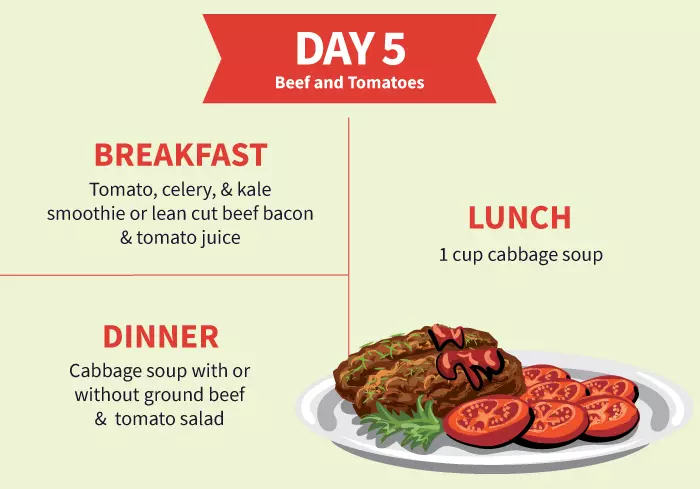
| Early Morning | Warm water with juice of half a lime |
| Breakfast | Tomato, celery, and kale smoothie or lean cut beef bacon and tomato juice |
| Lunch | Cabbage soup |
| Post-Lunch | Tomato, carrot, and coriander leaves smoothie |
| Dinner | Cabbage soup with or without ground beef and tomato salad |
Why This Works
Starting your day with a glass of warm water and lime juice is a great way to boost metabolism and flush out the toxins. Have a nutrient-loaded breakfast with a smoothie or grilled beef bacon and tomato juice to help support your organs. Cabbage soup with non-starchy veggies will keep you active post lunch. If you feel hungry after two to three hours of lunch, have a glass of tomato smoothie to energize and rejuvenate yourself. Have a medium or small bowl of cabbage soup and a generous portion of ground beef to get the optimum protein to rebuild your muscles.
Foods To Eat
Vegetables –
Leek, celery, Chinese cabbage, cabbage, carrot, tomato, turnip, broccoli, collard greens, radish greens, green beans, kale, spinach, bok choy, Brussels sprouts, asparagus, beetroot, okra, bitter gourd, and bottle gourd.
Fruits – Avoid eating fruits on this day.
Protein – Ground beef, ground turkey, chicken breast, salmon, mushroom, and legumes.
Fats & Oils – Olive oil, rice bran oil, hemp seed oil, flax seed oil, sunflower oil, sunflower butter, clarified butter (ghee), and peanut butter.
Nuts &Seeds – Pumpkin seed, flax seed, melon seeds, almonds, and hazelnuts.
Herbs & Spices – Coriander leaves, nutmeg, parsley leaves, rosemary, thyme, dill, oregano, cardamom, black pepper, cayenne pepper, cinnamon, fenugreek seeds, cumin, saffron, garlic, ginger, turmeric powder, and bay leaf.
Beverages – Green tea, black tea, black coffee, herbal tea, fresh fruit juice, and coconut water.
Condiments – Homemade coriander leaf chutney with lemon and salt, homemade mint chutney with lemon and salt, and homemade yogurt dip without sugar.
Foods To Avoid
Vegetables –
Potato, green peas, sweet corn, and sweet potato.
Fruits – Mango, green grapes, black grapes, and pear.
Fats & Oils – Lard, butter, margarine, mayonnaise, safflower oil, corn oil, and cottonseed oil.
Grains – Avoid all kinds of grains.
Nuts & Seeds – Cashew nuts, walnuts, and macadamia nuts.
Beverages- Alcohol, packaged fruit juices, and packaged coconut water.
Condiments- Tomato ketchup, chili sauce, soy sauce, mayonnaise dip, ranch dip, and tartar sauce.
Substitutes
Lime juice –
Apple cider vinegar
Tomato – Grapefruit, watermelon, and red bell pepper
Celery – Cucumber or leek
Kale – Spinach or carrot
Beef bacon – Turkey, pork bacon or mushrooms
Carrot – Beetroot, celery or cucumber
Coriander leaf – Parsley
Ground beef – Ground turkey, ground chicken, chicken breast, tuna, salmon
Precautions
Always opt for lean cuts of beef. Do not consume tomato if you are not allowed to do so by your doctor due to medical reasons.
Useful Tip
Add a dash of lime and black salt to your post-lunch smoothie to enhance its taste and uplift your mood.
Exercises For Day 5
- Leg circles – 1 set of 5 reps for each leg (clockwise and anticlockwise).
- Pelvic circles – 1 set of 10 reps (clockwise and anticlockwise).
- Arm circles – 1 set of 10 reps (clockwise and anticlockwise).
- Wrist circles – 1 set of 10 reps (clockwise and anticlockwise).
- Shoulder and neck rotations – 1 set of 10 reps (clockwise and anticlockwise).
- Spot jogging – 5-7 minutes.
- Lunges – 2 sets of 5 reps.
- Scissor kicks – 2 set of 10 reps.
- Push-ups – 2 sets of 5 reps.
- Tricep dips – 2 sets of 10 reps.
- Yoga asanas.
Warning:
People with heart conditions or any other medical condition should consult their doctor or a fitness trainer to know the best workout plan for losing weight.
How You Will Feel By The End Of Day 5
You are going to love Day 5 because it is a break from the same veggies and fruits. However, be careful about the portion size. Overeating on this day will impact your weight loss and performance. If followed properly, you will replenish the lost proteins and feel much more energetic than any other day on this diet.
Let’s move on to the next day, Day 6, where you get to eat some more exciting foods.
Day 6: Beef And Vegetables
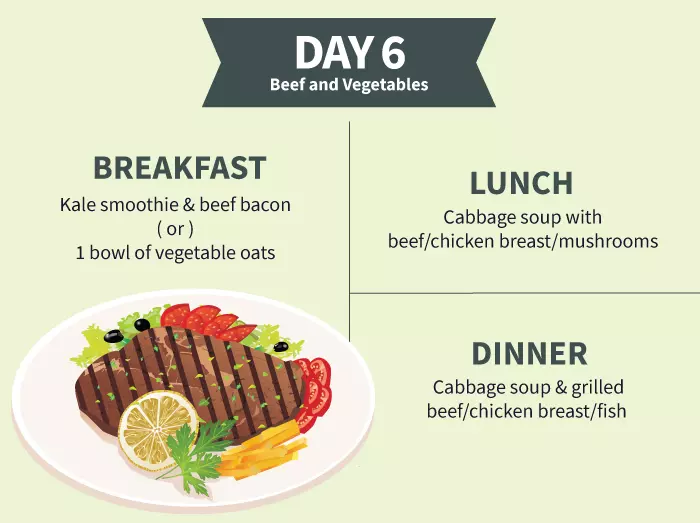
| Early Morning | Apple and lemon and warm water detox drink |
| Breakfast | Kale smoothie and beef bacon or 1 bowl of vegetable oats |
| Lunch | Cabbage soup with beef/chicken breast/mushrooms |
| Post-Lunch | 1 glass kiwi and apple juice |
| Dinner | Cabbage soup and grilled beef/chicken breast/fish |
Why This Works
The morning detox water will help to balance the pH of your gut and facilitate bowel movement. The veggie smoothie will keep you full for longer and help in fat mobilization. Eat a medium portion of beef and cabbage soup to provide your body with the essential amino acids. A post lunch fresh fruit juice will curb your carb cravings. Well seasoned grilled beef chops and a medium bowl of cabbage soup will help your build body proteins and strengthen your muscles.
**For Vegetarians (Day 5 & Day 6)
If you are a vegetarian, opt for lentils, kidney beans, black-eyed peas, chickpeas, mushrooms, and tofu.
Foods To Eat
Vegetables –
Leek, celery, Chinese cabbage, cabbage, carrot, tomato, turnip, broccoli, collard greens, radish greens, green beans, kale, spinach, bok choy, Brussels sprouts, asparagus, beetroot, okra, bitter gourd, and bottle gourd.
Protein – Ground beef, ground turkey, chicken breast, salmon, mushroom, and legumes.
Fats & Oils – Olive oil, rice bran oil, hemp seed oil, flax seed oil, sunflower oil, sunflower butter, clarified butter (ghee), and peanut butter.
Nuts & Seeds – Pumpkin seed, flax seed, melon seeds, almonds, and hazelnuts.
Herbs & Spices – Coriander leaves, nutmeg, parsley leaves, rosemary, thyme, dill, oregano, cardamom, black pepper, cayenne pepper, cinnamon, fenugreek seeds, cumin, saffron, garlic, ginger, turmeric powder, and bay leaf.
Beverages – Green tea, black tea, black coffee, herbal tea, fresh fruit juice, and coconut water.
Condiments – Homemade coriander leaf chutney with lemon and salt, homemade mint chutney with lemon and salt, and homemade yogurt dip without sugar.
Foods To Avoid
Vegetables –
Potato, green peas, sweet corn, and sweet potato.
Fruits – Mango, green grapes, black grapes, and pear.
Grains – Avoid all kinds of grains.
Fats & Oils – Lard, butter, margarine, mayonnaise, safflower oil, corn oil, and cottonseed oil.
Nuts & Seeds – Cashew nuts, walnuts, and macadamia nuts.
Beverages – Alcohol, packaged fruit juices, and packaged coconut water.
Condiments – Tomato ketchup, chili sauce, soy sauce, mayonnaise dip, ranch dip, and tartar sauce.
Substitutes
Apple –
Cucumber
Fenugreek seeds – Triphala powder
Lemon – Apple cider vinegar
Carrot – Celery
Tomato – Beetroot or cucumber
Spinach – Kale
Cucumber – Carrot or watermelon
Beef – Turkey, chicken breast, tuna, salmon, mushrooms, or kidney beans
Lettuce – Chinese cabbage
Zucchini – Cucumber
Onion – Chive or leek
Beetroot – Celery or tomato
Precaution
Avoid using too much oil to grill the meat. Since you will be taking a lot of cabbage soup, you may experience bloating. Consult your doctor to avoid stomach cramps or unusual bowel movement.
Useful Tip
Thinly slice the apple and refrigerate the detox water overnight so that it is fortified with all the vitamins and minerals.
Exercises For Day 6
- Leg circles – 1 set of 5 reps for each leg (clockwise and anticlockwise).
- Pelvic circles – 1 set of 10 reps (clockwise and anticlockwise).
- Arm circles – 1 set of 10 reps (clockwise and anticlockwise).
- Wrist circles – 1 set of 10 reps (clockwise and anticlockwise).
- Shoulder and neck rotations – 1 set of 10 reps (clockwise and anticlockwise).
- Yoga asanas.
How You Will Feel By The End Of Day 6
By the end of Day 6, you will start to notice the improvement in your muscle structure and strength. Your body will look more toned than before. The pain from exercising will also reduce.
So, one more day to go! Your determination and hard work will speak for you. Let’s see what is in store for you on Day 7.
Day 7: Brown Rice, Vegetables And Unsweetened Fruit Juices
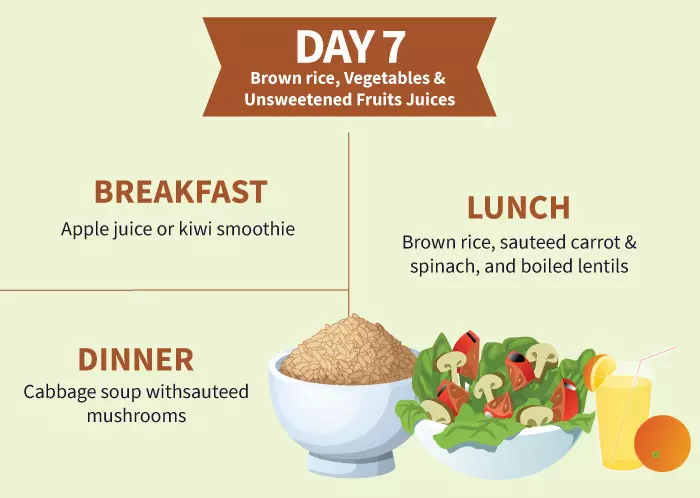
| Early Morning | Cinnamon tea |
| Breakfast | Apple juice or kiwi smoothie |
| Lunch | Brown rice, sauteed carrot & spinach, and boiled lentils |
| Post-Lunch | Snack on an apple or any other fruit except banana |
| Dinner | Cabbage soup with sauteed mushrooms |
Why This Works
Cinnamon is an active weight loss ingredient. Have a cool fruit smoothie for breakfast to boost your immunity. Brown rice is more nutritious as compared to white rice. Have a small portion of brown rice with other veggies to have a nutritious lunch. You may feel hungry by evening. Snack on a fruit (except banana) to keep your calories down. Fortify the cabbage soup with protein-rich mushrooms to help build lean muscle mass.
Foods To Eat
Vegetables –
Leek, celery, Chinese cabbage, cabbage, carrot, tomato, turnip, broccoli, collard greens, radish greens, green beans, kale, spinach, bok choy, Brussels sprouts, asparagus, beetroot, okra, bitter gourd, and bottle gourd.
Fruits – Apple, kiwi, watermelon, honeydew melon, plum, orange, grapefruit, nectarine, and guava.
Protein – Mushroom and legumes.
Grains – Brown rice, oats, quinoa, and cracked wheat.
Fats & Oils – Olive oil, rice bran oil, hemp seed oil, flax seed oil, sunflower oil, sunflower butter, clarified butter (ghee), and peanut butter.
Nuts & Seeds – Pumpkin seed, flax seed, melon seeds, almonds, and hazelnuts.
Herbs & Spices- Coriander leaves, nutmeg, parsley leaves, rosemary, thyme, dill, oregano, cardamom, black pepper, cayenne pepper, cinnamon, fenugreek seeds, cumin, saffron, garlic, ginger, turmeric powder, and bay leaf.
Beverages – Green tea, black tea, black coffee, cinnamon tea, herbal tea, fresh fruit juice, and fresh coconut water.
Condiments – Homemade coriander leaf chutney with lemon and salt, homemade mint chutney with lemon and salt, and homemade yogurt dip without sugar.
Foods To Avoid
Vegetables –
Potato, green peas, sweet corn, and sweet potato.
Fruits – Mango, green grapes, black grapes, and pear.
Fats & Oils – Lard, butter, margarine, mayonnaise, safflower oil, corn oil, and cottonseed oil.
Nuts & Seeds – Cashew nuts, walnuts, and macademia nuts.
Beverages – Alcohol, packaged fruit juices, and packaged coconut water.
Condiments – Tomato ketchup, chili sauce, soy sauce, mayonnaise dip, ranch dip, and tartar sauce.
Substitutes
Cinnamon tea –
Green tea or black coffee
Apple juice – Cucumber juice
Kiwi smoothie – Kale and pomegranate smoothie
Brown rice – White rice (only if you are suffering from IBS), oats or quinoa
Carrot – Collard greens or brussels sprouts
Spinach – Kale
Boiled lentils – Boiled peas, boiled Bengal gram, or sautéed mushrooms
Apple – Celery soaked in vinegar
Sautéed mushrooms – Veg kidney bean chili or low-fat yogurt
Exercises For Day 7
- Leg circles – 1 set of 5 reps for each leg (clockwise and anticlockwise).
- Pelvic circles – 1 set of 10 reps (clockwise and anticlockwise).
- Arm circles – 1 set of 10 reps (clockwise and anticlockwise).
- Wrist circles – 1 set of 10 reps (clockwise and anticlockwise).
- Shoulder and neck rotations – 1 set of 10 reps (clockwise and anticlockwise).
- Stairs running or running – 5-10 minutes.
- Squat – 2 sets of 5 reps.
- Crunches – 2 sets of 10 reps.
- Pilates – hold for 15-20 seconds.
- Yoga breathing exercises.
** Check the various fitness workouts here.
How You Will Feel By The End Of Day 7
I am sure you have noticed the difference. You have lost not only water weight but also fat, which is great as you look much slimmer and toned up now. You are much more active and positive in your outlook, which is one of the best benefits of exercising regularly and following the cabbage soup diet plan religiously.
It is strictly not recommended to follow this diet plan beyond Day 7. Let’s see why in the next section.
Beyond Day 7
The cabbage soup diet plan should not be followed beyond Day 7 as it is a short-term weight loss program. Eating low calories for a long time will stall your body’s weight loss, and it will switch to the starvation mode. This can lead to weight gain. A break of a week or two will help break the monotony and will not allow your body to adapt to the low-calorie diet. It will also help you lose weight without losing interest in the diet plan.
Note: Remember, while this diet plan recommends daily meals, exercise suggestions, and substitutions, it focuses primarily on short-term results without sufficient emphasis on long-term sustainability. The potential health risks associated with such a restrictive diet need to be understood. So, you should consult a healthcare professional before trying this diet.
Keeping in mind your daily nutrient requirements, here is the original 7-day cabbage soup diet recipe. We have also provided a list of substitutes to help you modify the cabbage soup recipe. Make it delicious and enjoyable as per your taste.
4. How To Prepare The Original Cabbage Soup Diet Weight Loss Recipe?
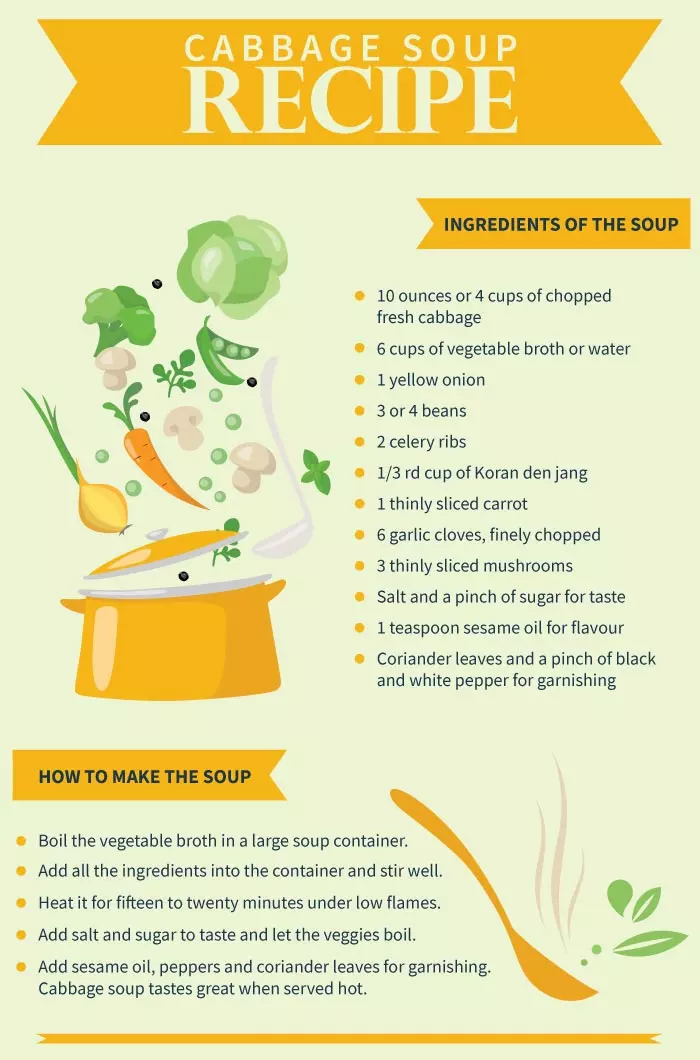
Preparing cabbage soup is easy. Here are the ingredients and directions.
Ingredients
- 10 ounces or 4 cups of chopped fresh cabbage
- 6 cups of vegetable broth or water
- 1 yellow onion
- 3 or 4 beans
- 2 celery ribs
- 1/3 rd cup of Korean den jang
- 1 thinly sliced carrot
- 6 garlic cloves, finely chopped
- 3 thinly sliced mushrooms
- Salt and a pinch of sugar for taste
- 1 teaspoon sesame oil for flavor
- Coriander leaves and a pinch of black and white pepper for garnishing
How To Make
- Boil the vegetable broth in a large soup container.
- Add all the ingredients to the container and stir well.
- Heat it for 15-20 minutes on a low flame.
- Add salt and sugar to taste and let the veggies boil.
- Add sesame oil, peppers, and coriander leaves for garnishing. Serve hot.
5. Substitutions For The Cabbage Soup Diet Recipe
- You may use red onions instead of yellow ones.
- You may use boiled shredded chicken instead of mushrooms.
- You may include vegetables like zucchini, spinach, and kale.
- You may add corn instead of sugar. Add a touch of sweetness with a drizzle of honey or maple syrup.
- You may also change the flavor and smell of the soup by adding different herbs such as bay leaves, parsley, dried thyme or basil leaves.
- Add a kick of heat to your soup by incorporating spicy ingredients like jalapeños, chili powder, or hot sauce.
- For a smoky flavor, add a pinch of smoked paprika or chipotle powder.
- You may use fish or chicken instead of beef in the diet plan.
Instead of milk, you may drink soy milk. - If you are craving for butter, use any butter spray available in the market instead of using butter for the soup.
- For a creamy and comforting version of cabbage soup, blend a portion of it with coconut milk, almond milk, or cashew milk.
- You may eat papaya, apricot or kiwi instead of banana.
So, how exactly does the cabbage soup diet for weight loss work? Here is the science behind this diet plan.
6. Scientific Explanation Behind This Diet
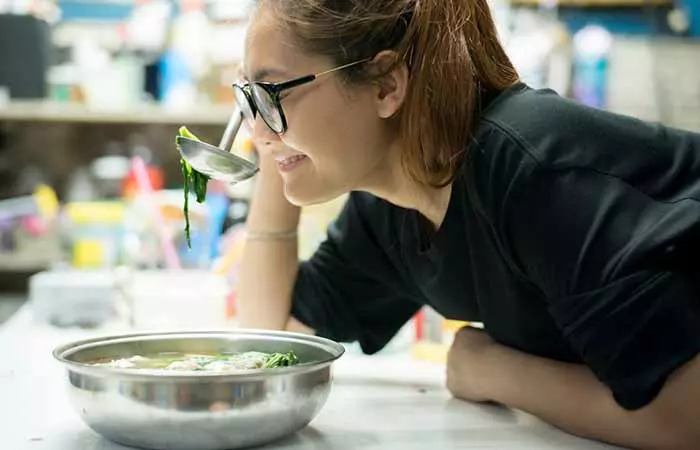
- The cabbage soup diet is low in calories, and you may lose weight quickly. This plan also includes a good amount of protein, vitamins, and minerals that are essential for our body.
- Cabbage has anti-inflammatory and antioxidanti Molecules that protect your body from free radical substances which can harm your body if their levels rise. properties (5). It may lower cholesterol and is good for the digestive system.
- Brown rice is a good source of vitamins B1, iron, and dietary fiber (6). Scientists have found that people who eat brown rice are much healthier and also weigh less (6).
- Tomatoes are low in calories and fiber-rich (7). They also help fight cancer (7). Including tomatoes in this diet plan enriches the soup with nutrients and is a good kick for the taste buds.
- Milk is a good source of calcium, potassium, and vitamin D (4). It strengthens and supports your bones.
- Fruits and vegetables are rich in vitamins, minerals, polyphenolic flavonoids, and micro-nutrients (2). They will provide your body with nutrients and keep a check on fat accumulation.
- Beef is a good source of protein, vitamins, minerals, and has no carbohydrates (8). It may help improve muscle function and reduce fatigue.
 Trivia
TriviaHow else can you benefit from the cabbage soup diet? Let’s find out in the next section.
7. Benefits Of The Cabbage Soup Diet

a. Rapid Weight Loss
- The cabbage soup diet can cause rapid weight loss in a short span of time as it is a high-fiber soup diet plan.
- By following this diet, you can lose up to 10 lbs in just 7 days. The proponents of this diet claim that it causes more weight loss in the same period as compared to other diets. However, it may vary from person to person.
- This diet is particularly suitable for those who want to lose weight fast.
b. No Hunger Pangs
This diet enables you to have as much soup as you wish along with an unlimited amount of fruits or veggies as well as meat on specific days. You can even have baked potatoes. Hence, you are less likely to suffer from hunger pangs during the day.
c. Provides Energy
- Initially, the cabbage soup diet might make you feel weak, light-headed, and tired because of the toxins and processed foods leaving your body.
- These effects vary individually, and eventually, they will subside.
- By the fourth day of the program, you will experience a significant increase in your energy levels.
d. Supply Of Nutrients And Vitamins
- This diet ensures a healthy supply of nutrients and vitamins. It is centered around cabbage soup, which is packed with healthy nutritious vegetables.
- You are also allowed to have unlimited fruits as well as meat. This can give your body a significant boost in vitamins.
- Tomatoes and other fruits, such as dark berries, are rich in antioxidants (7), (9).
e. Simple And Inexpensive
- The cabbage soup diet is relatively simple and inexpensive to follow. It does not involve complex meal plans or expensive dietary supplements.
- Exercise is not required. All you need to do is consume healthy fruits and vegetables along with cabbage soup during the seven-day period.
- Unlike other diets, it does not require a long-term commitment. Thus, you not only feel great by losing weight and cleansing your body of toxins and processed foods but are also able to save money.
In spite of the fact that the cabbage soup diet has yielded positive results in terms of weight loss, it is not recommended by health practitioners for more than a week. Like most fad diets, this diet is not without side effects, and you should be aware of them before following this diet plan.
8. Side Effects Of The Cabbage Soup Diet

Mary Sabat, MS, RD, LD, says, “Nutritionists do not typically recommend the cabbage soup diet due to its lack of essential nutrients, and it is not scientifically proven to burn belly fat. Additionally, consuming large amounts of cabbage can cause digestive issues, such as diarrhea.”
Here are some drawbacks of this diet:
a. Causes Starvation
When you follow this diet, you are restricted to consuming cabbage soup and vegetables on a particular day. Complex carbs satiate your appetite and keep you full (10). As cabbage soup contains fewer carbs, you are most likely to feel hungry.
b. Causes Flatulence
While following the cabbage soup diet, you are most likely to experience flatulence. Excess consumption of cabbage and other vegetables like broccoli can cause flatulence (11). In the same view, Connie Song, a blogger said “I couldn’t survive past day two — due to an extremely uncomfortable stomach and intestinal gas. It wasn’t a pleasant experience, but a two-day cabbage detox was good for my body, mind, and soul (i).” Though the diet didn’t work for her it helped her focus on breaking bad food habits and practicing healthy living.
c. Risk Of Fatigue
This diet involves a drastic reduction in caloric intake, which will cause your energy levels to drop and you might experience fatigue. Carbohydrates and healthy fats are your body’s sources of energy (12), (13).
The exclusion of these vital nutrients from your daily consumption can make you feel sleepy and lazy throughout the day. You might suffer from a lack of energy to work out and for other activities.
d. Inadequate Nutrition
The main defect of the cabbage soup diet is that neither has it been set up in a nutritionally balanced way nor is it based on the proven principles of weight loss.
Kofoed adds, “Doctors and nutritionists generally don’t recommend this diet for one significant reason: it puts a person into an extreme calorie deficit. The cabbage soup diet is great for rapid weight loss because you’re consuming so few calories in a day, and you are also excluding carbohydrates besides fruit – so you’re likely to lose a lot of water weight in 7 days. You’re putting yourself into an intense period of restriction for a week, which is likely to lead to overeating and binging (and regaining any weight you lost) after the fast.”
It does not allow too much intake of proteins and carbohydrates. Hence, you are likely to suffer from nutritional deficiencies while following this diet. No wonder, it lasts for just seven days!
e. Frequent Urination
Consumption of too much soup and water in this diet can cause you to urinate more than usual. Cabbage is a natural diuretic (14), which means that it promotes the secretion of water from your body.
Other fruits and vegetables can also cause frequent urination as the natural produce is packed with water.
f. Causes Dizziness
Dizziness is another side effect of this diet. You might end up feeling light-headed due to the low intake of calories.
The lack of carbs and fat in cabbage can cause your body to get fatigued to the extent of fainting (15). This can only be cured by increasing the intake of calories.
g. Can Cause Mood Swings
There is a lack of vital nutrients in the course of the diet. Hence, you are likely to become moody and irritable (16). Lack of proper nourishment for your body can make you suffer both physically and emotionally.
Though you will succeed in losing weight, you might experience migraines, light-headedness, and mood swings in the course of the diet. Eventually, you become slower, which will affect your work.
h. Poses Health Risks
It is not a natural weight loss program since 90% of the weight lost is water weight and not fat. Not only is this unhealthy, but the extra fat held by your body before the diet will still be there. Since this diet is low in nutritional value, it will put your body in a state of starvation and energy saving mode, thus lowering metabolism and causing the reverse effect of actually gaining weight.
Don’t get bogged down. The point here is to make it clear that this diet plan should not be followed continuously. Here are a few other points you should keep in might to get the most out of this diet plan.
9. Dos and Dont’s Of The Cabbage Soup Diet
| Dos | Dont’s |
|
|
While this diet may help decrease your weight, remember, sustainable weight loss is best achieved through long-term lifestyle changes, not quick fixes. You should consult a healthcare professional before starting this diet, especially if you have any pre-existing health conditions, as it may pose some health risks.
Additionally, your exercise routine should be tailored to individual needs and limitations, starting gradually and increasing intensity over time. Adhering to a restrictive diet can be challenging, but following strategies like meal prepping, finding healthy substitutes, and seeking support from friends or family helps make the process easier.
Key Takeaways
- The cabbage soup diet is a short-term weight loss regimen for seven days paired with 30 mins of exercise.
- This low-sodium and low-calorie diet allow the burning of fat to produce energy.
- Consume fruits and vegetables with a low glycemic index while on this diet.
- The cabbage soup diet is not nutritionally balanced which may lead to health problems if followed for an extended period.
Infographic: Cabbage Soup Diet Benefits
The cabbage soup diet is low in calories, high in fiber, and is a known detox soup diet for effective weight loss. It involves eating large quantities of cabbage soup and is considered a short-term weight loss diet. Along with rapid weight loss, this soup diet offers many other health benefits. Click on the infographic below to learn how this diet can benefit your health.
Some thing wrong with infographic shortcode. please verify shortcode syntax
Cabbage soup diet is a 7-day weight loss diet that claims to give you immediate results. While it might seem impossible to consume just cabbage for 7 days, this diet regimen actually includes fruits, veggies, and proteins as well. Rich in fiber and low in calories, while this fad diet seems to help lose weight in the short term, it should not be followed for a longer period to avoid nutritional deficiencies and possible adverse effects. Following this diet plan along with a daily exercise routine would help you see a visible difference soon.
Frequently Asked Questions
I am diabetic. Can I go for cabbage soup diet?
Please consult your doctor first. The cabbage soup diet should be modified according to your medical condition.
How much cabbage soup should be consumed every day?
The soup should be the main component of the cabbage soup diet. You can take 2-3 bowls of this soup per day.
How soon can I repeat the cabbage soup diet?
Start after 2-3 weeks. This will give your body a break from the low-calorie diet and rejuvenate you.
I am 17. Can I go on a cabbage soup diet?
You are still growing and need more nutrition and energy. Check with your doctor for the best way to follow this diet.
Can I eat bananas for all the 7 days?
Banana is high in fruit sugar, carbs, and starch. Hence, it is best that you don’t eat it every day while on this diet.
I am feeling weak, getting headaches and cannot sleep at night. Should I stop the cabbage soup diet?
As this diet is a low-calorie diet, if you don’t take enough protein, you will start to feel weak. This weakness leads to other problems such as headache and insomnia. Try to eat boiled egg whites, boiled chicken or boiled mung beans (moong dal). Do not workout.
I am feeling bloated and constipated. What shall I do?
Drink more water if you are feeling constipated. Gentle exercise will also help you. You may take gas-relieving pills after consulting your doctor.
I don’t seem to lose any weight even after following the diet strictly.
Avoid sugar and spices, put less salt in your soup, drink more water, and do not use butter (see 5th point).
Illustration: Day Cabbage Soup Diet For Weight Loss: Does It Work?
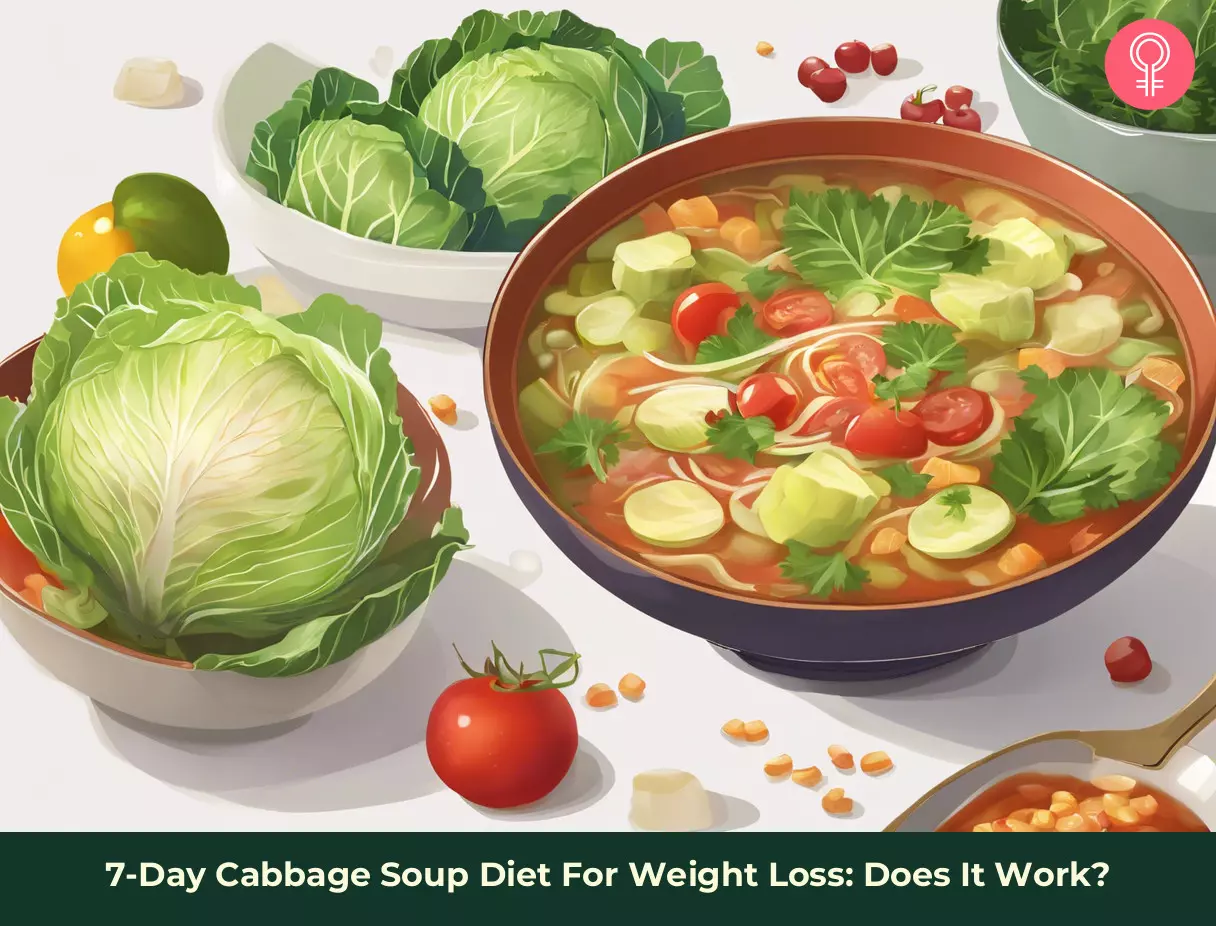
Image: Stable Diffusion/StyleCraze Design Team
Get to know the transformative power of the cabbage soup diet when followed for a week. Witness the effects and decide if it’s the right fit for you. Watch this video!
Personal Experience: Source
StyleCraze's articles are interwoven with authentic personal narratives that provide depth and resonance to our content. Below are the sources of the personal accounts referenced in this article.
(i) Why I Almost Didn’t Survive the Cabbage Soup Detoxhttps://thehubpublication.com/why-i-almost-didnt-survive-the-cabbage-soup-detox-eb8d06df08dd
References
Articles on StyleCraze are backed by verified information from peer-reviewed and academic research papers, reputed organizations, research institutions, and medical associations to ensure accuracy and relevance. Read our editorial policy to learn more.
- Functional Foods in fad diets: A review
https://www.researchgate.net/publication/327028063_Functional_Foods_in_fad_diets_A_review - Health Benefits of Fruits and Vegetables
https://www.ncbi.nlm.nih.gov/pmc/articles/PMC3649719/ - Bananas as an Energy Source during Exercise: A Metabolomics Approach
https://www.ncbi.nlm.nih.gov/pmc/articles/PMC3355124/ - Milk and dairy products: good or bad for human health? An assessment of the totality of scientific evidence
https://www.ncbi.nlm.nih.gov/pmc/articles/PMC5122229/ - Anti-inflammatory Effects of Brassica oleracea Var. capitata L. (Cabbage) Methanol Extract in Mice with Contact Dermatitis
https://www.ncbi.nlm.nih.gov/pmc/articles/PMC5909311/ - Brown rice: Nutrition and health claims
https://www.researchgate.net/publication/348973191_Brown_rice_Nutrition_and_health_claims - Nutritional attributes of tomatoes
https://www.researchgate.net/publication/268516162_Nutritional_attributes_of_tomatoes - The role of beef in human nutrition and health
https://www.researchgate.net/publication/317298356_The_role_of_beef_in_human_nutrition_and_health - The emerging role of dark berry polyphenols in human health and nutrition
https://www.researchgate.net/publication/357858372_The_emerging_role_of_dark_berry_polyphenols_in_human_health_and_nutrition - Carbohydrates Appetite and Feeding Behavior in Humans
https://academic.oup.com/jn/article/131/10/2775S/4686468?login=true - Sources and Severity of Self-Reported Food Intolerance after Ileal Pouch–Anal Anastomosis
https://www.sciencedirect.com/science/article/abs/pii/S0002822306013903 - Carbohydrates and obesity: from evidence to policy in the UK
https://www.cambridge.org/core/journals/proceedings-of-the-nutrition-society/article/carbohydrates-and-obesity-from-evidence-to-policy-in-the-uk/BD29AE068D940BC655A5A04BFB33402D - Carbohydratesfats and satiety
https://academic.oup.com/ajcn/article-abstract/61/4/960S/4651964 - IDENTIFICATION AND QUANTITATIVE DETERMINATION OF STEROIDAL COMPOUNDS IN THE PLANT MATERIAL OF CABBAGE
https://journals.uran.ua/sr_pharm/article/view/118169/115159 - Cabbage raw
https://fdc.nal.usda.gov/fdc-app.html#/food-details/169975/nutrients - Food for thought: an exploratory study of how physicians experience poor workplace nutrition
https://nutritionj.biomedcentral.com/articles/10.1186/1475-2891-10-18
Read full bio of Reda Elmardi
- Kathrine Kofoed is an ACE-certified health coach with three years of experience. She has a master's degree in Human Nutrition from the University of Copenhagen. She helps clients adopt a food freedom approach so they can have a healthy relationship with food, improve their body image, and feel at peace with food, exercise, and healthy living.
 Kathrine Kofoed is an ACE-certified health coach with three years of experience. She has a master's degree in Human Nutrition from the University of Copenhagen. She helps clients adopt a food freedom approach so they can have a healthy relationship with food, improve their body image, and feel at peace with food, exercise, and healthy living.
Kathrine Kofoed is an ACE-certified health coach with three years of experience. She has a master's degree in Human Nutrition from the University of Copenhagen. She helps clients adopt a food freedom approach so they can have a healthy relationship with food, improve their body image, and feel at peace with food, exercise, and healthy living. - Mary Sabat, MS, RDN, LD, is a registered dietitian and a certified in personal training by the American Council of Exercise. She has 30 years of experience in nutrition education, wellness coaching, fitness training, holistic health, and weight loss coaching. She obtained her bachelor's degree in Dietetics and Nutrition from the University of Delaware and master’s degree in Human Nutrition with an emphasis on Exercise Science from Rutgers University.
 Mary Sabat, MS, RDN, LD, is a registered dietitian and a certified in personal training by the American Council of Exercise. She has 30 years of experience in nutrition education, wellness coaching, fitness training, holistic health, and weight loss coaching. She obtained her bachelor's degree in Dietetics and Nutrition from the University of Delaware and master’s degree in Human Nutrition with an emphasis on Exercise Science from Rutgers University.
Mary Sabat, MS, RDN, LD, is a registered dietitian and a certified in personal training by the American Council of Exercise. She has 30 years of experience in nutrition education, wellness coaching, fitness training, holistic health, and weight loss coaching. She obtained her bachelor's degree in Dietetics and Nutrition from the University of Delaware and master’s degree in Human Nutrition with an emphasis on Exercise Science from Rutgers University.
Read full bio of Ravi Teja Tadimalla
Read full bio of Payal Karnik







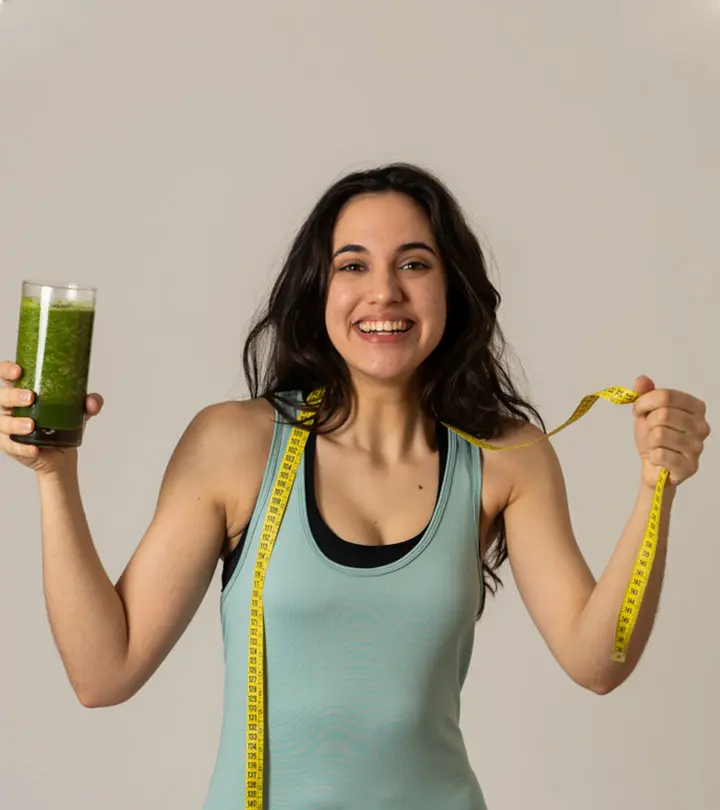

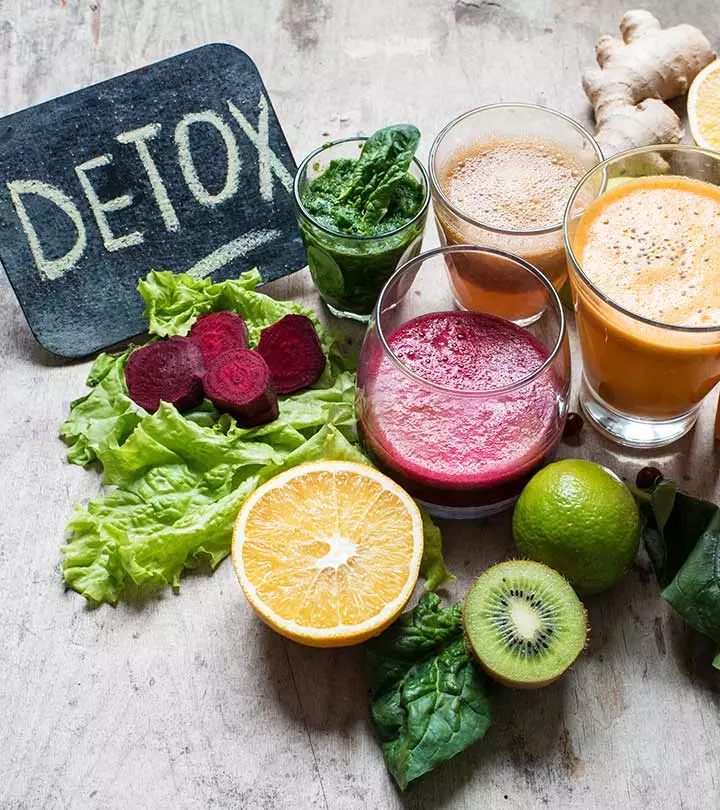
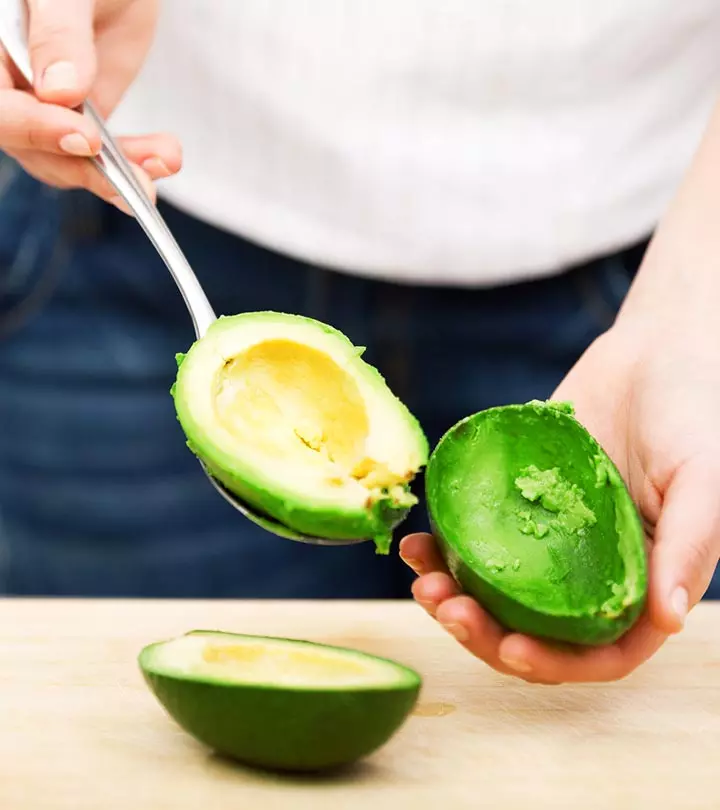
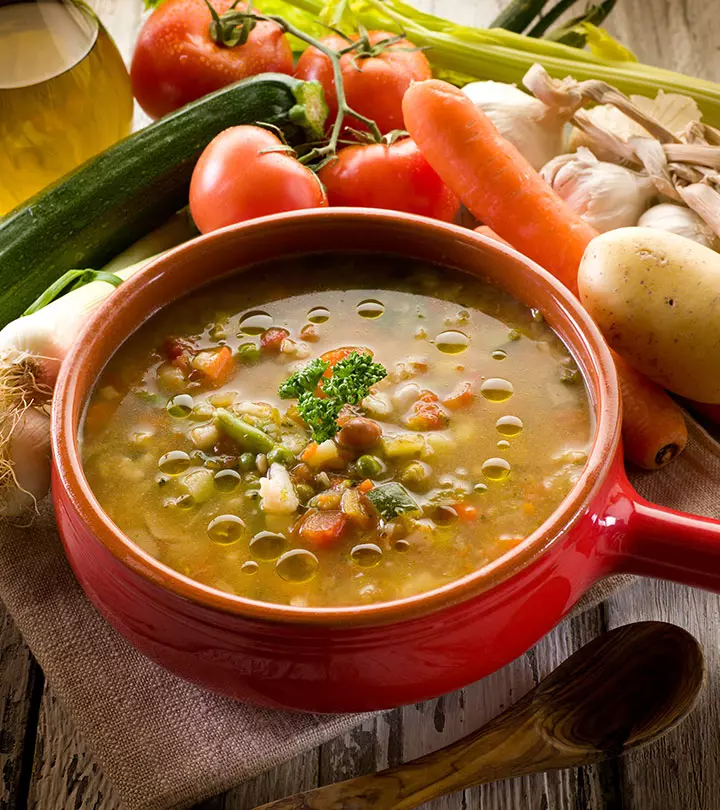






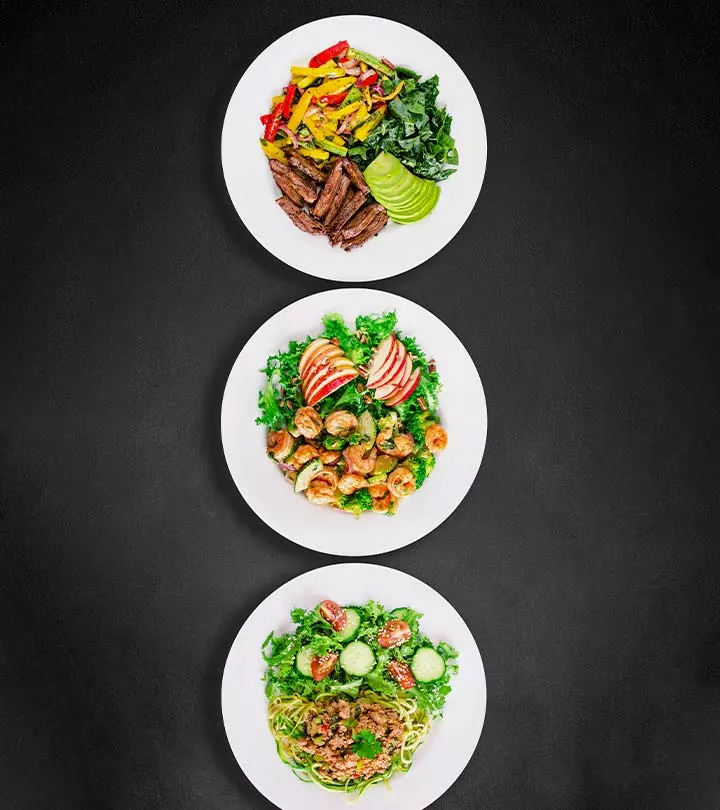
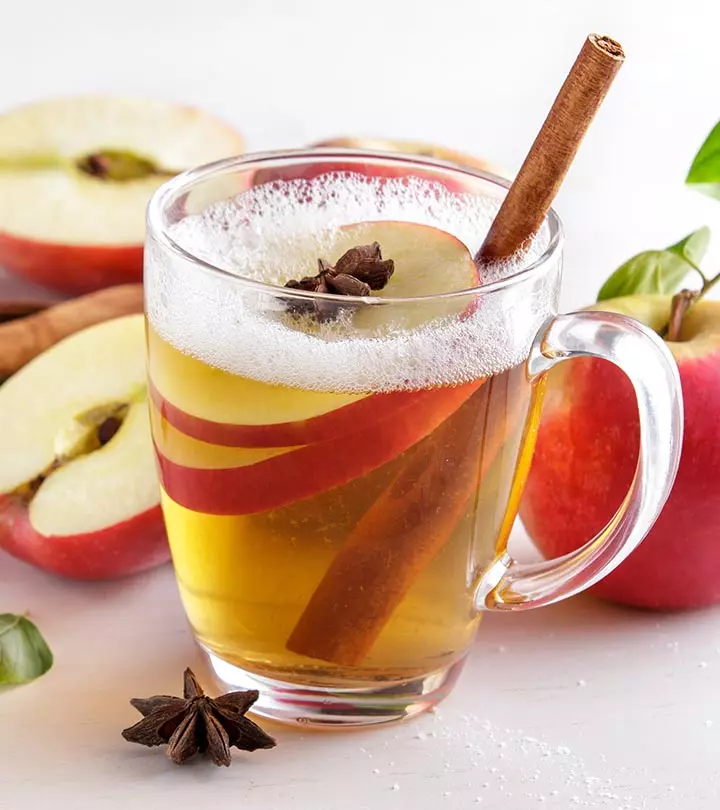
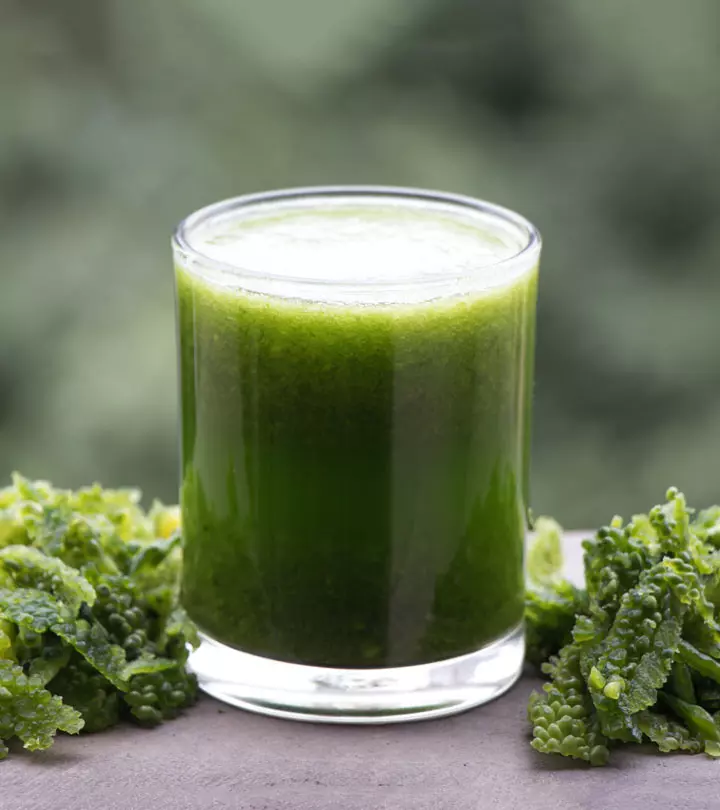
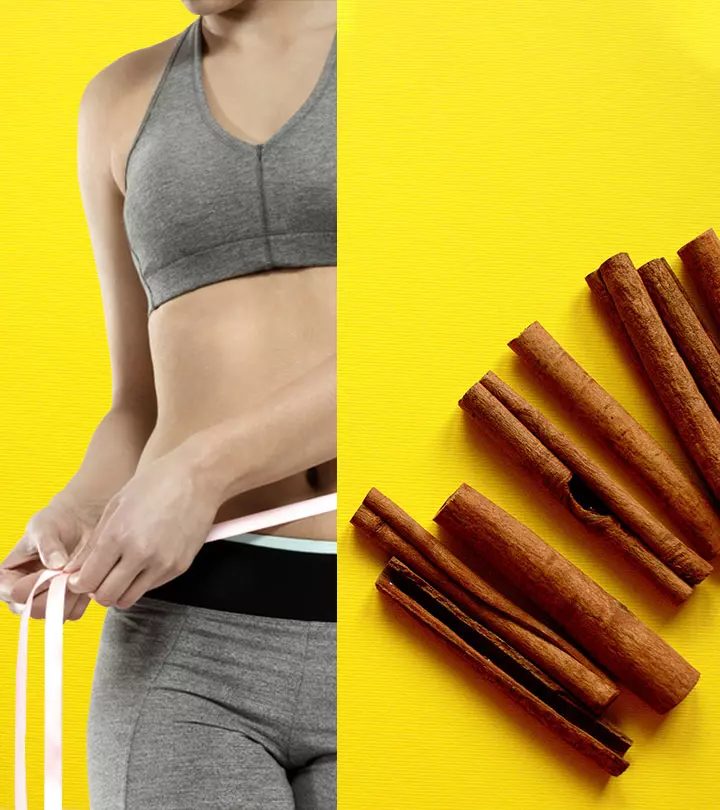




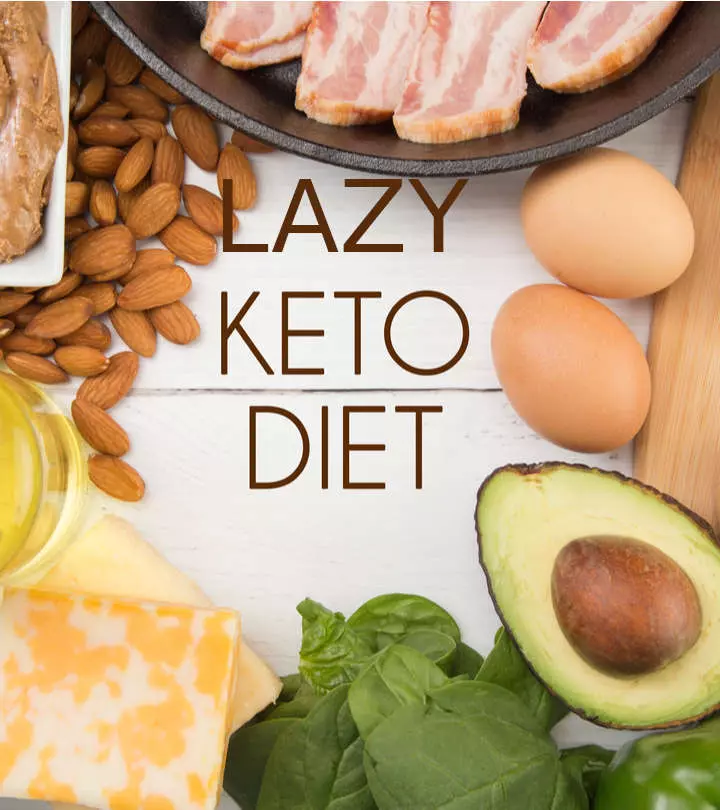
Community Experiences
Join the conversation and become a part of our empowering community! Share your stories, experiences, and insights to connect with other beauty, lifestyle, and health enthusiasts.